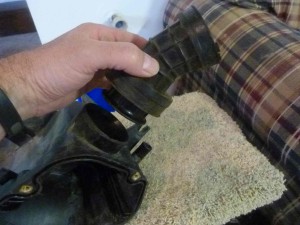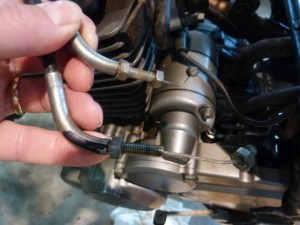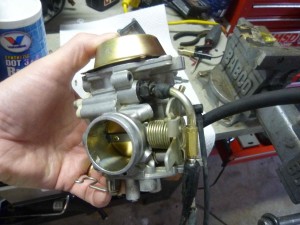You may have the same problem I’ve got.
One of my bikes – a 2000 Kawasaki KL250 Super Sherpa dual sport – is a hard-starting son of a gun. Reason? It’s jetted ultra-lean. Meaning, it’s starved for gas.
It’s the same issue that plagued cars back in the late ’70s/early ’80s – when cars still had carbs.
Fuel flow using a carburetor is mechanically limited by whatever jet size is installed in the carb. A “jet,” by the way, is a small orifice through which the fuel passes on its way to the engine. A “leaner” jet has a smaller-diameter orifice; a “richer” one a larger-diameter orifice. There are – usually – two types of jets. The pilot jet meters the fuel at idle – a big factor, cold-start (and starting, period). The main jet meters fuel once the engine’s running faster than idle, as when you’re trying to accelerate.
The only way to nose those late ’70s/early ’80s-era carbureted cars through increasingly stricter emissions testing was by leaning them out (less gas in the air-fuel mix) until they squealed.
Or rather, until they sputtered and coughed and refused to start.
You may remember.
That problem was fixed via fuel-injection, which allowed for more precise (and – key thing – electronically adjustable) air-fuel mixes, especially at cold start – when emissions are highest.
But bikes have only recently gone FI en masse.
Many bikes built before about 2005 or so still came from the factory with carbs. And the bike manufacturers dealt with the conundrum of getting past “smog” – emissions standards – the same way that car manufacturers did 30-something years ago: They leaned the proverbial snot out of ’em. The pilot and main jets are sized to make government happy – not you. They are typically at least a couple sizes too small for efficient/quick cold-starts and maximum performance. As in the case of my hard-starting, takes-forever-to-warm-up KL250.
The fix, luckily, is easy: Up-jet that son-of-a-gun!
First, though, you’ve got to get at the jets. That is best done with the carb off the bike – in part because you’ll be able to see what you’re doing better – very important as regards the small/fragile pilot jet especially – but also because the little screws you’ll need to remove to get the fuel bowl off (to access the jets, underside of the carb) are seemingly made of cheese and very easy to chew up unless you use exactly the right size Phillips head screwdriver and it’s exactly centered on the screw. This is hard to do with the carb still attached to the bike.
So, Step One: Carb removal –
Begin by removing the seat and then the fuel tank (two 10 mm bolts at the rear; plug the rubber fuel line hoses to keep gas from leaking all over). You’ll next need to remove the air box – a large hunk of plastic that – in addition to housing the air filter – also serves as a mounting point for the battery as well as the bike’s electric components. Unbolt the battery and set it aside; slip off the rubber thingies that secure the electrical stuff and gently place the electrical stuff off to the side. It is not necessary to disconnect these components – and lose track of what goes where.
Now, loosen – but do not remove – the rear mud guard. There are four large – obvious – Phillips head screws holding it to the frame. Take ’em off, and you’ll have the necessary jiggle/wiggle room to work the air box out of the frame. It, incidentally, is secured to the frame by a couple of also-obvious 10 mm bolts – and a pair of not-so-obvious 10 mm bolts that secure the underside of it (facing the rear tire) to a rubber mud flap near the swing arm.
Next remove the rubber tube that connects the carburetor to the air box. It is clamped to the carb’s throat on one end and to the air box intake on the other. Loosen the clamps, then work the rubber tube loose and take it off. Remove the air box and set it aside.
Now, for the carb!
You’ll next need to slip the throttle cables (there are two, push and pull) off the carburetor’s body. Loosen the 10 mm adjusting nut, then by hand rotate the throttle arm on the carb so that you can pop out the cable ends and separate them from the throttle arm. The last cable you’ll need to deal with is the choke cable. On this bike, I find it is easier to loosen the nut at the choke pull (up by the handle bars) and slip the cable off the bike and remove it still attached to the carb rather than removing it from the carb. This will save you much hassle come re-install time.
Now you can remove the carb and bring it over to your work bench for the work that needs to be done.
We’ll get into that in detail in Installment Two – which should be up next week sometime!
Throw it in the Woods?











Sure remember those gas starved engines. Topped off with the all too small exhaust systems that made it hard for them to breath too. Yikes…….
My 1976 Chevy took forever to warm up, it would sputter and sometimes stall, not a good thing when your trying to make a left turn in busy traffic in the early morning. It never gave me problems with starting up though, kick the gas pedal first time in the day to set the choke and turn the key, started no matter how cold it was. Started on days people with early FI were dead in the cold.
It was night and day with a bigger pipes and the carb fixed up though. That small block V-8 seemed to have so much more power. Frankly CAFE made that car unsafer and far slower then it had to be.
Ditto all that, Rich!
I still own a ’76 Trans-Am and – carb properly set up, true dual exhaust without cats – the beast starts right up every time, regardless of the weather. But the factory settings were ultra-lean and the poor car was corked up with a single exhaust – a “Y” pipe from the engine that fed into a single cat and from there to a muffler with two outlets.
Long since thrown in the woods . . .
Also on your sherpa, you’ll notice a vacuum manifold…that’s to prevent you from snap accelerating. I had a DRZ400S in the early 00s…got rid of the factory Vacuum controlled carb…and it was suddenly a rippin’ dirt bike!
You can get the carb/etc working great without touching the exhaust (don’t want to violate the 96db rule).
Hi Rich,
Excellent tip – thanks! I’m waiting for my jets to arrive … hope to have the bike operational again by the weekend and will post a follow-up on the results of these mods, etc.
Then there is the quick & dirty shortcut fix for late model KLR650 EPA/ CARB approved carb:
22 cent smile maker
Holy s—e man!!! It’s a whole new bike about 3500rpm! I shimmed the needle with one #4 washer and turned the mixture screw to 2 turns out. Ripped out the snorkel, pain by the way! No L-cut or screen removal until I do exhaust, then we get the KLX needle and new main.
One thing that was odd…the mixture screw was almost fully seated from the factory, maybe only 1/16 of a turn out from seated! Hope they don’t let many of those get out.
#4 stainless washers at 2-cents a piece….needless to say I got a whole handful!
http://klrworld.com/forums/your-next-generation-klr650/22-cent-smile-maker-holy-crap!!!/
Hi Gary,
I may try his – shimming the needle – but first, I want to see how it does with a several sizes larger pilot and main jet. The stock pilot is 17.5 and I’m going up to a 20 – and 132.5 on the main.
I’m also gonna do a valve clearance check. The bike only has about 3,500 miles on it, but if the clearance is off, it can make a hard-start problem worse…
The PITAS part is the cams have to be removed to add/subtract shims…
@Eric- Oh I know about shims. If one or two are needed you have to hunt around for the right one, are stuck with the old one(s), or do we just by the whole set???? The good news is once done they stay set for a long time.
I opened up the intake snorkel (I had no intention of crossing 3 foot deep rivers), did the shim (one or two – you have to experiment with your bike), fattened up the pilot jet a bit and drilled two 1/4 inch holes (no bigger) into the inner baffle on my ’08 KLR650. It made the bike much more responsive & a very nice improvement at all ranges. But I never fattened up the main jet or went to (a too-noisy-for-me) after market exhaust. The Kaws are what they are, and it is best not to try and make them into a $18,000 KTM or BMW.
I used to be able to do HTML stuff, no problem. That was then, this is now.
Then BrentP. springs on me, “A different sort of Phillips screw standard is used in Japan.”
I had ten different (well, maybe three) Philips screwdrivers for all the shit I had to try to twist. Now you’re telling there’s a reason why I failed to do it eloquently?
Thanks for that, it’s good to know. … I thought it was me.
And to ‘them’ I say, “Thank you Very freaking Much for Telling Me!”
Tomorrow, I’ll look at Mithrandir’s link and I imagine I’ll get an ah-ha moment.
I doubt it’ll be a good, ah-ha moment, but I’ll take ’em as they come along.
Anyway, I wonder how many other people thought, after eric wrote, “You’ll next need to remove the air box – a large hunk of plastic that – in addition to housing the air filter – also serves as a” … A mouse nest?
I’ve seen a lot of nice KL’s on Craigslist, I want every single one of them. … If only I were a rich man.
Thanks for sharing, Helot. This is how we win. We choose to become experts on screwdrivers. We stare into instances of the abyss of truth, and gradually learn the big aggregations of the abyss of truth, but never let the abyss consume us, or make us feed its infinite appetite.
The truth is just what is. There are A manufacturers of B screwdrivers made to C specs. There may even be D handcrafted and non-standard varieties. To the PTB, A,B,C, % D are just things that can be scraped against concrete, until they are shivs. Thus PTB=abyss. We already know about abyss, hence PTB are irrelevant to are equations and can be eliminated from further consideration.
From physical screwdrivers to real life screwdrivers is just a jump on the jump to conclusions map, not far at all. It’s X% chance your Dad is a criminal. Y% chance he has sex with his secretary. It’s Z% chance your Mom had sex with the family mechanic. At a later date, you learn said Z was arrested for a strong arm bank heist, which definitely makes you wonder if X+Z is a factor.
It’s knowing your XYZs and still looking everyone in the eye with enough of your sanity intact. True sanity means ability to thrive within the natural permanent laws of creation. Societal constructs exist to control, not to enlighten, so transcend them.
When you XYZ, examine your zipper, truly do so, then you can like wise look into the abyss of everyone else. You’ve got your xyz. They’ve got their xxyyzz.
You don’t want to be a Boy Scout. Be molested by some Boy Scout troop leader. You get the books, and you earn the badges on your own. Collect the real badges, not the fake ass brokeback badges of babbit jamborees.
On my honor, I will do my best
To do my duty to myself and my patriarchy and to obey the Natural Law;
To help deserving people at all times;
To keep myself physically strong, mentally awake and target acquisitive of my selected moral objectives.
**The stories and information posted here are artistic works of fiction and falsehood. Only a fool would take anything posted here as fact.**
When is a Phillips not a Phillips?
Some different screw drive types
When it’s a phirrips screw driver, like BrentP says?
Disclaimer: Regarding my racist comment: Our National Plantation Owners have us all entered in national races. Those in the Japan corral are far ahead of US, I’m sure most masculine/analytical minds would agree.
A different sort of Phillips screw standard is used in Japan. If you use a US Phillips on them they strip easily. The material used on many JIS fasteners doesn’t help either. With a JIS philips screw driver it will be much easier not to damage the screws.
Yup!
My solution, though, has been to replace such fasteners with stainless steel Allen-head ones. The look better – and they’re much easier to deal with. You can buy kits or – much less expensive – go to a good hardware store (True Value) that has a big selection of loose fasteners.
Eric – I’ve had real good results dealing with Eagle Mike over at KLR650.net for my stainless fasteners, jets, etc. He even offers a really nice little stainless steel packable “jack stand” you use in conjunction with your kickstand to get a wheel up off the ground for trail-side maintenance. He got me straight on the jetting for my KLR650. Let’s just say that the dealership the previous owner took it too for “service” saved me about $1200 off the purchase price by installing a Dynojet 255 main along with the Supertrapp exhaust. The bike was running like it was burning coal and would barely get 30 MPG. The dealer told him this was “normal” and to run it with the airbox door removed to help “lean it out.” He was so disgusted that he priced the bike low enough (and had put so many accessories on it) that I didn’t even haggle.
I put a 242 main jet and a KLX needle in the carb, fixed the Supertrapp (yeah, the dealer screwed that up too), installed a new foam filter, reinstalled the airbox door and yippee! MPG now in the low 40s even with ME riding it (i.e. I have trouble with my right wrist). It’s no sport bike, but it will top out at 100 and pulls like a tractor in the low end. It’s stable enough to run highway speeds on gravel roads. There ain’t nuthin like a thumper and especially a Kaw.